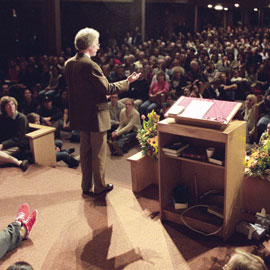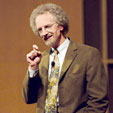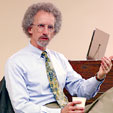 |


|
Winter 2003 | Volume 26, Number 1 | ||||||
| Befriending Doubt
A Skeptic by Nature, Author Philip Yancey Has Made His Peace With God "I became a writer, I now believe, to sort
out words used and misused by the
church of my youth. Although I heard that
‘God is love,’ the image of God I got from sermons more resembled an angry, vengeful
tyrant.
We sang, ‘Red and yellow, black and white, they are precious in
his sight …’ but just let one of those red, yellow, or black children
try entering
our church. Bible college
professors insisted, ‘We live not under law but under
grace,’ and for the life of me I could not tell much difference between the two
states. Ever since, I have been on a quest to unearth the good news, to scour
the original words of the gospel and discover what the Bible must mean by using
words like love, grace,
and compassion to describe God’s own character. I sensed truth in those words,
truth that must be sought with diligence and skill, like the
fresco masterpieces that lie beneath layers
of plaster and paint in ancient chapels. “God has a soft spot for those who struggle,” he encouraged the entire SPU community at a convocation in Brougham Pavilion. According to Yancey, God allows a great degree of freedom to the rebellious and honors their honesty. “I write books about things I ’m learning, not things I ’ve mastered,” he assured more than 300 area pastors assembled for a luncheon in Gwinn Commons. Yancey still struggles with authority and with the legacy of doubt that followed being raised in a racist and legalistic church. “Jesus Christ is the magnifying glass of my faith,” he informed a standing-room-only audience at First Free Methodist Church for a public lecture on the uniqueness of Christianity. “I spent a lot of time out in the blurry margins of belief when what I needed to do was point my magnifying glass at Jesus so I could see clearly.” Befriending the doubt in his life led Yancey to write 16 books with provocative titles such as Where Is God When It Hurts? and What’s So Amazing About Grace? With more than 5 million copies in print, Yancey’s works have won 11 Gold Medallion Awards from the Evangelical Christian Publishers Association. “I use Yancey’s books in the University Foundations courses at SPU,” says Bob Drovdahl, professor of Christian ministries and education. Part of the Common Curriculum required of all students, Foundations courses examine the bedrock of Christian belief. “I want my students to ‘see’ someone thinking about the Christian faith,” says Drovdahl. “Yancey models the process of theological work, which accompanies our effort to teach the product of theological work: basic Christian doctrine.” Drovdahl finds in Yancey someone willing to ask hard questions, someone with clear convictions yet open to evidence that points toward fresh understandings. “I have used The Jesus I Never Knew to introduce students to Jesus as the epicenter of Christian faith and life,” says Rob Wall, professor of Christian scriptures at SPU. “Most freshmen know what they believe but not why, and not in depth. Yancey’s book provoked questions that led them into a more honest understanding of Jesus and a sense of his relevance to life today.” During his visit to campus, Yancey told Seattle Pacific students, “Jesus doesn’t make life easier, but a lot more complicated” when it comes to thorny issues like confronting Saddam Hussein in Iraq. Based on his own understanding of the teachings of Jesus, Yancey is “totally against an unprovoked war with Iraq,” and that puts him at odds with other devout Christians. The author of Reaching for the Invisible God urged those with troubling questions to find “doubt companions” with whom they could safely explore difficult issues. He also encouraged them to let God know they care. “Job skated right to the edge of heresy,” marvels Yancey, yet God expressed approval of Job’s candor and restored his life. “God can put up with just about everything but indifference.” Yancey believes that all the philosophical arguments against God are included in scripture. He has great respect for a God who not only gives his people the freedom to doubt, but also the words to express that doubt. In counterpoint, Wall, who has taught at SPU since 1978, believes that Yancey actually romanticizes doubt. “The standard against which he reacts is a fundamentalist form of Christianity that has shaped only a few of our students.” Wall says that the ways of understanding God in Seattle Pacific’s Wesleyan faith tradition “are far more generous than Yancey’s perspective allows.” Few remain neutral after a Philip Yancey encounter. Junior English major Rachael Darden approached The Jesus I Never Knew with some misgivings, fearing it might present a heretical Jesus unsubstantiated by scripture. “I was apprehensive and unsure about the book’s validity, but as I read I realized that this was not a false interpretation of Jesus, but rather one that explored the truth of who Jesus was and what his life means to Christians today.” Yancey brings up “the questions you hide deep inside you because if you voice them, someone may think you are not a Christian at all,” says Beryl Carpenter ’68, who attended two of Yancey’s lectures at Seattle Pacific. “But these are just the doubts that need to be answered if we are to live fully victorious lives.” Merry Jensen ’02, SPU performing groups coordinator, believes Yancey spoke from his heart and experience when he said that Christ came for the person who doesn’t fit in. “For me, that longing to belong is answered in being part of God’s family, loved and accepted just the way I am by the one who matters most.” One person’s doctrinal peccadillo is another person’s honest examination. Yancey launched a bold search for truth in his college years, and while his incredulity didn’t always endear him to administrators, he was a gifted student. With graduate degrees in communication and English from Wheaton College Graduate School and the University of Chicago, he joined the staff of Campus Life magazine in 1971 and served eight years as editor. It was “a grace-filled place,” he says, and excellent training for the freelance writing to follow. Since 1978, Yancey has focused on writing books and magazine articles that have appeared in 80 different periodicals, including Christian Century and The Saturday Evening Post. His bimonthly column in Christianity Today alternates with one by Chuck Colson and is a popular podium from which Yancey teases out the paradoxes of the faith and writes about people whom he admires for their faith-in-action. He also serves as an editor-at-large for Christianity Today and co-chair of the editorial board for Books and Culture. Yancey is beginning a new book — with the working title of What on Earth God Wants — about a daily relationship with God. Though he again plans to tackle his subject from the stance of a skeptic, Yancey argues that of all religions, Christianity makes the most sense. It is, he believes, the sovereign God’s intended way of life for humanity. — BY CLINT KELLY
|
Click on images to enlarge. |


